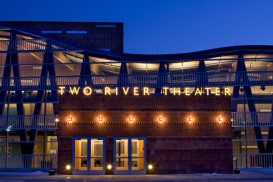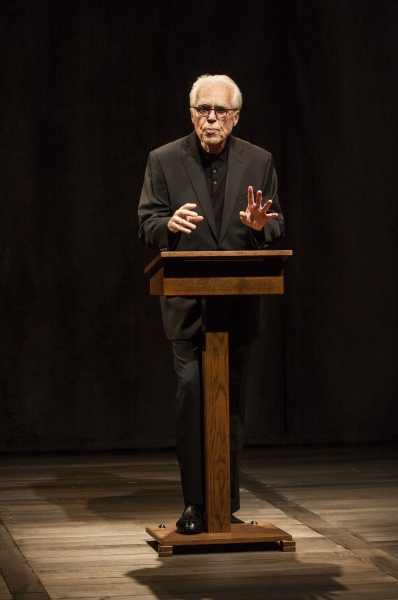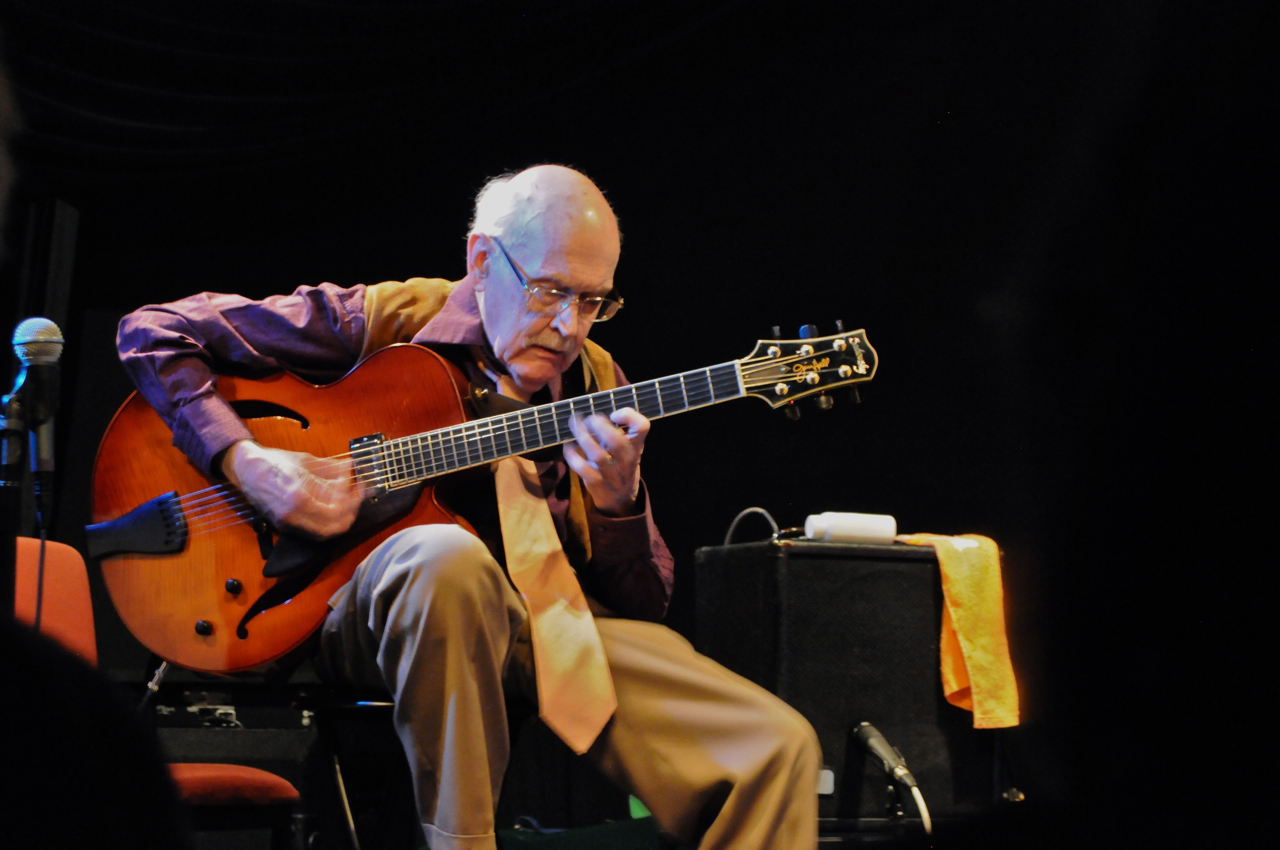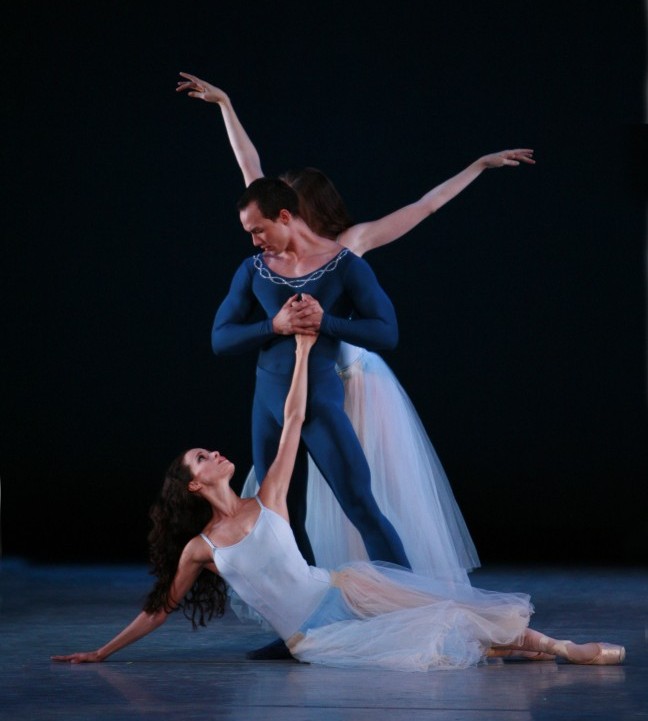Longtime readers of this blog may recall that I used to get out a lot more often. The truth is that I spend roughly the same amount of time in places other than my apartment, but I spend a larger chunk of it at the theater, both in New York and on the road. As a result, I have less time to see other things. Mrs. T, whose interests are as wide-ranging as my own, has been warning me of late not to get stuck in a rut, so I took her to the opera last month, and over the weekend we attended a nonstop string of performances that put me in mind of the days when I seemed never to be home after dark.
 On Friday afternoon we drove from rural Connecticut to Red Bank, New Jersey, the home of Count Basie, Edmund Wilson, and Two River Theater Company, which has just mounted a revival of Present Laughter, my favorite Noël Coward play, whose star, Michael Cumpsty, is one of my favorite stage actors. We were there for professional reasons, of course–I’ll be reviewing the show in Friday’s Wall Street Journal–but we went with the reasonable expectation of having a good time.
On Friday afternoon we drove from rural Connecticut to Red Bank, New Jersey, the home of Count Basie, Edmund Wilson, and Two River Theater Company, which has just mounted a revival of Present Laughter, my favorite Noël Coward play, whose star, Michael Cumpsty, is one of my favorite stage actors. We were there for professional reasons, of course–I’ll be reviewing the show in Friday’s Wall Street Journal–but we went with the reasonable expectation of having a good time.
I’ll have plenty to say about the production on Friday, but I can tell you now that we had a frightful time getting to Red Bank. The sky fell on Friday, and what should have been a three-hour road trip took twice as long. We spent the whole of it clawing our way through heavy rain and heavier traffic, arriving at the theater at 7:45, far too late to have dinner before the show. Later that night we made the mistake of stopping at a Burger King on the Garden State Parkway. I’m pretty tolerant when it comes to fast food, but should you ever be unfortunate enough to find yourself at the Cheesequake service area, don’t eat anything.
It was still pouring when we reached upper Manhattan, where I unloaded the car, dropped Mrs. T at our front door, and drove straight to the nearest parking garage, which was full. I’ll draw a veil of discretion over the soggy half-hour that followed.
On Saturday we hauled ourselves out of bed and went to Penn Station to pick up my carry-on bag, which I’d left in Washington, D.C., six days earlier. That’s another story, so I’ll skip to the good part, which is that Amtrak found the bag and shipped it to New York gratis. What’s more, the contents, which included a brand-new GPS and two months’ worth of expense-account receipts, were intact. I do solemnly swear never to tweet about Amtrak’s wi-fi service again.
 From there we took a cab to the Atlantic Theater Company, where we saw a preview of 3 Kinds of Exile, John Guare’s new play. It’s no secret that I admire Guare pretty much without reserve, and this production is all the more noteworthy given the fact that it also constitutes his professional acting debut. It would be an understatement to say that I now also admire his nerve!
From there we took a cab to the Atlantic Theater Company, where we saw a preview of 3 Kinds of Exile, John Guare’s new play. It’s no secret that I admire Guare pretty much without reserve, and this production is all the more noteworthy given the fact that it also constitutes his professional acting debut. It would be an understatement to say that I now also admire his nerve!
Once again, I’ll keep my opinions to myself–you can read them on Friday–but it’s worth noting how unusual it is for a major playwright who is not already known as an actor to assume a role in one of his own plays. Thornton Wilder did it more than once, appearing in Our Town as the stage manager several times in the Thirties and Forties, and he also played the part in a 1946 Theatre Guild on the Air radio broadcast in which he shared the microphone with Dorothy McGuire. (I’ve heard an air check of the performance, which is fascinating.) Since then, no other name springs readily to mind.
We got home in time for a much-needed nap, after which we headed back downtown. This time our destination was the Jazz Standard, where we ate barbecue and listened to Jim Hall, the best of all possible jazz guitarists. Not only is Hall the greatest living jazz soloist, but he’s eighty-two years old, so I decided that it was damned well about time for Mrs. T to hear him in person.
 ArtistShare recently brought out a wonderful three-disc set of live recordings made in 1975 by Hall, Don Thompson, and Terry Clarke at the same Toronto gig that produced Jim Hall Live! The latter album, which didn’t make it to CD, amazingly enough, until 2003, is by common consent Hall’s greatest recording, a judgment in which I wholeheartedly concur. That doesn’t mean his playing has been on the decline since 1975, though. To the contrary, it’s grown increasingly subtle and daring. Yes, Hall looks frail–he walks with a cane–but you’d never guess his age from hearing him play.
ArtistShare recently brought out a wonderful three-disc set of live recordings made in 1975 by Hall, Don Thompson, and Terry Clarke at the same Toronto gig that produced Jim Hall Live! The latter album, which didn’t make it to CD, amazingly enough, until 2003, is by common consent Hall’s greatest recording, a judgment in which I wholeheartedly concur. That doesn’t mean his playing has been on the decline since 1975, though. To the contrary, it’s grown increasingly subtle and daring. Yes, Hall looks frail–he walks with a cane–but you’d never guess his age from hearing him play.
I interviewed Hall ten years ago for The Wall Street Journal. He said something to me back then that has stuck in my mind:
My playing used to be a little bit conservative, but I think I’ve gained courage. It’s not that I’m playing better. I certainly don’t have more chops. I guess it’s just lack of fear! I just basically don’t give a damn now. I feel I’m O.K. Miles Davis was a hero of mine in a lot of ways, and I always figured Miles was kind of like Picasso–he just sort of kept letting himself grow. That’s what I’m trying to do, let myself grow. Sort of like a painter, or a writer. I don’t want to live in the past.
He didn’t then. He doesn’t now.
Back to bed, then up again at noon to go to Lincoln Center. I recently resolved to introduce Mrs. T to the miracle that is George Balanchine, and on Sunday I delivered the goods by taking her to New York City Ballet for an all-Balanchine matinee.
The program was supposed to start with Concerto Barocco, which is set to Bach’s Two-Violin Concerto. It happens that Concerto Barocco also opened the program when I paid my own first visit to NYCB in the winter of 1987, an experience that changed my life. I wrote about it in All in the Dances, my brief life of Balanchine:
At five minutes past eight, the houselights went down and the curtain flew up, revealing eight young women dressed in simple white ballet skirts, standing in front of a blue backdrop. The scrappy little band in the pit slouched to attention, the conductor gave the downbeat, and the women started to move, now in time to Bach’s driving beat, now cutting against its grain. As the solo violinists made their separate entrances, two more women came running out from the wings and began to dance at center stage. Their steps were crisp, precise, almost jazzy….They made no obviously theatrical gestures, exchanged no significant glances, yet I felt sure they were telling some kind of story. Was I missing the point? All at once I understood: the music was the story. The dancers were mirroring its complex events, not in a singsongy, naively imitative way but with sophistication and grace. This was no dumb show, no mere pantomime, but sound made visible, written in the air like fireworks glittering in the night sky. When it was over, eighteen breathless minutes later, the audience broke into friendly but routine applause, seemingly unaware that it had witnessed a miracle. Rooted in my seat, eyes wide with astonishment, I asked myself, Why hasn’t anybody ever told me about this?
 Alas, Sunday’s program was changed at the last minute, but in a way that didn’t trouble me in the least: Barocco was replaced by Serenade, Balanchine’s first American ballet, a setting of Tchaikovsky’s C Major String Serenade that is widely and rightly thought to be an ideal introduction to his work. Next came Stravinsky Violin Concerto, one of his late masterpieces, followed by Stars and Stripes, a “dessert” ballet set to the fetchingly vigorous music of none other than John Philip Sousa.
Alas, Sunday’s program was changed at the last minute, but in a way that didn’t trouble me in the least: Barocco was replaced by Serenade, Balanchine’s first American ballet, a setting of Tchaikovsky’s C Major String Serenade that is widely and rightly thought to be an ideal introduction to his work. Next came Stravinsky Violin Concerto, one of his late masterpieces, followed by Stars and Stripes, a “dessert” ballet set to the fetchingly vigorous music of none other than John Philip Sousa.
The three works made for a well-balanced bill, and it had the desired effect on Mrs. T. “You can take me to the ballet any time,” she said as we left the theater to go to a rowdy engagement party (yes, there’s more!) for two close friends who decided to tie the knot.
That, in a jumbo nutshell, is what we did all weekend. Even for me, it was more than usually hectic, and I don’t plan to undertake anything like it again, at least not in the immediate future. But oh, how much fun it was to gallop once more from show to show, sharing with my beloved Mrs. T the beauty that is so indispensable to my existence! While I can’t say that our joint marathon made me feel younger–I don’t know when I’ve been so tired as I was on Saturday night–it definitely made me feel happier.
P.S. No, we didn’t watch the Tonys after we got home on Sunday, but I’m awfully glad that Tracy Letts won one.
* * *
Pacific Northwest Ballet dances an excerpt from the finale of George Balanchine’s Concerto Barocco:
